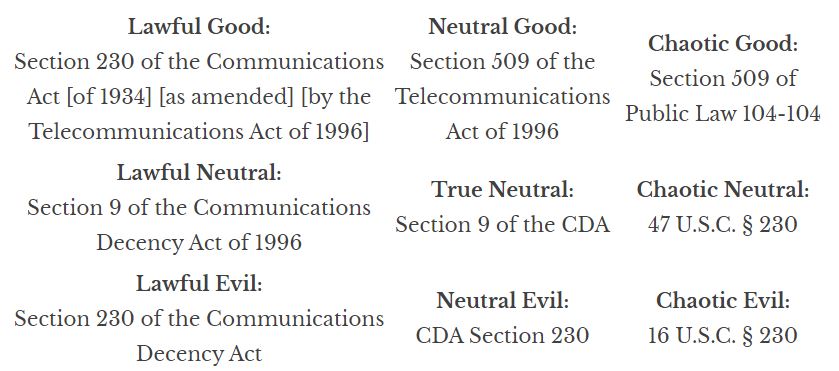Google and YouTube Aren’t “Censoring” Breitbart Comments–Belknap v. Alphabet
First Amendment. The court says “Neither Alphabet, nor its subsidiaries, Google and YouTube, are state actors.” Cite to PragerU v. YouTube. “Google and YouTube do provide the public with a forum for speech, but that does not make them state actors.” Cite to Halleck. Citing PragerU again, the court says that the state action exclusion for performing municipal functions doesn’t apply to online entities, and it’s irrelevant what words Google or YouTube used to describe themselves. The court summarizes:
The relevant question is whether Google and YouTube are state actors, not whether they offer a public forum for speech.
Like, how hard is that? This simple proposition, which the court elegantly summed up in a short sentence, has apparently eluded millions.
Section 230. Belknap’s Section 230 claim fares no better. The court correctly notes that Section 230 contains only one affirmative requirement. Section 230(d) requires services to notify consumers of the availability of parental control protections, an obligation that has been widely ignored and is frankly silly today. Section 230(d) has been referenced in court opinions only a few times, none in any dispositive way. The court says Belknap’s pleadings didn’t relate to Section 230(d).
The court adds that Section 230 is meant as a liability shield, not a cause of action, and other courts have held that the Communications Decency Act (CDA) does not create any private right of action. The court adds: “because § 230 is mostly a liability shield, § 230 is less likely to offer a private right of action than would provisions of the Communications Decency Act criminalizing harassing conduct, provisions that courts have uniformly concluded create no private right of action.”
The court doesn’t conclude that Section 230 preempts Belknap’s claim, but in a footnote, it correctly observes that “Belknap is attempting to hold Defendants liable for removing content created by a third party (i.e., the citizen “Posts” on Breitbart articles), the very conduct for which § 230(c)(1) generally protects internet-based actors like Defendants from liability.”
Implications. It’s easy to mock Belknap’s ill-informed arguments, but at least he has the excuse of proceeding pro se. Sadly, Belknap’s arguments are no worse in quality than the statements repeatedly made by numerous members of Congress who are actively seeking TODAY to burn down the Internet, even as thousands of Americans are dying each day due to a lethal pandemic. I think those members of Congress are more deserving of mocking and ridicule than Belknap is.
Nomenclature note. In a footnote, the court says:
Belknap’s Complaint refers to “Section 230 of the Federal Communications Law.” Aware of a “Section 230” of no other federal law governing internet communications, the Court presumes Belknap is referring to § 230 of the Communications Act of 1934. 47 U.S.C. § 230. The Communications Decency Act of 1996, part of the Telecommunications Act of 1996, amended the Communications Act of 1934 by adding § 230. Pub. L. No. 104-104, §§ 501, 509, 110 Stat. 56, 133, 137-39. Thus, Courts frequently refer to and analyze § 230 as part of the Communications Decency Act of 1996.
This brought to mind Prof. Blake Reid’s Section 230 Citation Alignment chart:
Though Belknap’s terminology was still wrong, it looks like Belknap was closer to “lawful good” than virtually all other Section 230 commentators.
(Per Prof. Reid’s taxonomy, my preferred nomenclature is “chaotic neutral.” I’ve been called worse).
Case citation: Belknap v. Alphabet, Inc., 2020 WL 7049088 (D. Ore. Dec. 1, 2020). Belknap’s 2-page handwritten complaint.
Selected Related Posts About State Action Claims
- LinkedIn Isn’t a State Actor–Perez v. LinkedIn
- Section 230 Preempts Another Facebook Account Termination Case–Zimmerman v. Facebook
- Section 230 Ends Demonetized YouTuber’s Lawsuit–Lewis v. Google
- Court Rejects Another Lawsuit Alleging that Internet Companies Suppress Conservative Views–Freedom Watch v. Google
- Another Suspended Twitter User Loses in Court–Wilson v. Twitter
- First Voters Reject Tulsi Gabbard, Then a Judge Does–Gabbard v. Google
- YouTube Isn’t a State Actor (DUH)–PragerU v. Google
- Facebook Still Isn’t Obligated to Publish Russian Troll Content–FAN v. Facebook
- Vimeo Defeats Lawsuit for Terminating Account That Posted Conversion Therapy Videos–Domen v. Vimeo
- Russia Fucked With American Democracy, But It Can’t Fuck With Section 230–Federal Agency of News v. Facebook
- Private Publishers Aren’t State Actors–Manhattan Community Access v. Halleck
- Your Periodic Reminder That Facebook Isn’t a State Actor–Williby v. Zuckerberg
- Section 230 Protects Facebook’s Account and Content Restriction Decisions–Ebeid v. Facebook
- Court Tosses Antitrust Claims That Internet Giants Are Biased Against Conservatives–Freedom Watch v. Google
- Twitter Isn’t a Shopping Mall for First Amendment Purposes (Duh)–Johnson v. Twitter
- YouTube Isn’t a Company Town (Duh)–Prager University v. Google
- Facebook Defeats Lawsuit By User Suspended Over ‘Bowling Green Massacre’–Shulman v. Facebook
- Yelp, Twitter and Facebook Aren’t State Actors–Quigley v. Yelp
- Facebook Not Liable for Account Termination–Young v. Facebook
- Online Game Network Isn’t Company Town–Estavillo v. Sony
- Third Circuit Says Google Isn’t State Actor–Jayne v. Google Founders
- Ask.com Not Liable for Search Results or Indexing Decisions–Murawski v. Pataki
- Search Engines Defeat “Must-Carry” Lawsuit–Langdon v. Google
- KinderStart Lawsuit Dismissed (With Leave to Amend)
- ICANN Not a State Actor
